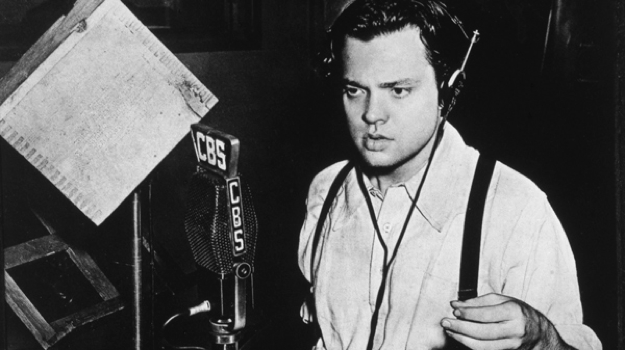
More Info
Orson Welles at work in the CBS Radio studio.(Dallas Dispatch-Journal/Wikimedia Commons/Public Domain)
‘War of the Worlds’ broadcast kicked off lasting myth
Imagine hearing this startling “news” while relaxing at home on a Sunday evening: “… those strange beings who landed in the Jersey farmlands tonight are the vanguard of an invading army from the planet Mars.”
If you were listening to CBS Radio’s Mercury Theatre on the Air program 81 years ago today, that’s exactly what you would have heard. That evening in 1938, host Orson Welles broadcast an adaptation of The War of the Worlds, the H.G. Wells novel about a Martian invasion of Earth.
At the time, newspapers reported that millions of listeners had believed that a Martian attack really was underway, resulting in mass hysteria. The stories claimed that thousands had fled their homes in panic, the stories claimed.
In truth, the broadcast created little panic. Most listeners understood that it was a dramatization, even though it was described as such only once during the program.
So was coverage of this “fake news” actually fake news? Apparently so.
No mass hysteria
A 2013 article in Slate blamed the mass panic myth on heated competition between newspapers and radio, the relatively new electronic medium that was gobbling up advertising dollars. “The newspaper industry sensationalized the panic to prove to advertisers, and regulators, that radio management was irresponsible and not to be trusted,” according to the authors Jefferson Pooley and Michael J. Socolow.
Ironically, what actually fooled people was not the program itself, but the false coverage of it. While today’s media landscape is nothing like it was in 1938, misinformation persists, and thrives, thanks to the multiplying factor of social sharing.
But news literacy education can counter this phenomenon by teaching us to discern the credibility of information and embrace some healthy skepticism (for example, NewseumED offers a “War of the Worlds”-themed activity). In fact, Welles ended his infamous broadcast with a nudge to do just that: “…if your doorbell rings and nobody’s there, that was no Martian. . . it’s Hallowe’en.”